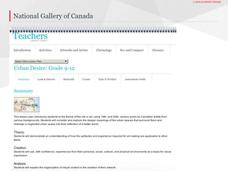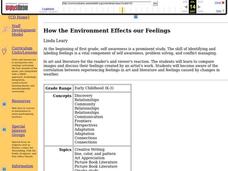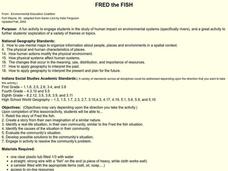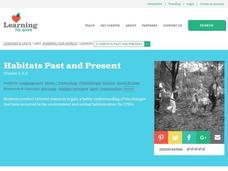Curated OER
Gaia: The Wisdom of the Earth
Learners are introduced to Gaia theory of natural homeostasis. They graph Earth's temperatures over time, construct terrariums or monitor the outdoor environment. Related videos titles are suggested, but may be outdated. The objectives...
School Improvement in Maryland
Smart Growth
New roads, new businesses, new developments, new mass transit systems. All growth has both positive and negative effects on communities. Government classes investigate the principles of Maryland's 1997 Smart Growth program and the...
National Gallery of Canada
Urban Desire
Urban spaces are often overlooked and broken down. Offer your pupils the opportunity to reimagine an urban space. Learners examine and discuss works of art related to this theme and consider their own communities. Small groups then...
Salt River Project
How Do We Clean Polluted Water?
How do we clean up oil spills and other pollutants in the water? Explore water treatment strategies with a set of environmental science experiments. Groups remove oil from water, work with wastewater treatment, and perform a water...
Curated OER
World Population
Young scholars examine the world population data using MyWorld GIS software and compare and contrast the population characteristics of countries around the world. Students summarize their findings in a report.
Curated OER
How the Environment Effects our Feelings
First graders compare images and discuss their feelings created by an artist's work. They explore the correlation between experiencing feelings in art and literature and feelings caused by changes in weather.
Curated OER
Creating a Job Community
Students design their own job communities. In this art and career exploration lesson, students are placed into groups to create models of business areas based on job types.
Curated OER
FRED the FISH
Young scholars engage in the study of the human impact on environmental systems (specifically rivers). This instructional activity enhances Students' exploration of a variety of themes or topics.
Curated OER
Evergreen's Green Team Energy Audit
Students investigate the ways energy is used at their school and how it can be changed. In this energy lesson, students participate in a service project related to energy. Students record and calculate changes that saved energy and the...
Curated OER
Rosie's Walk
Students use maps and globes to locate and describe locations, directions and scale. Using the maps, they identify man made or natural features of different environments. They practice using geographical terms to describe a specific...
Curated OER
What's The Plan?
Students identify how the human activities in the state of Maryland have changed/ evolved over the last 50 years. They evaluate a land planning document and prepare a fictitious planning document for a given area of land.
Curated OER
Disease and Epidemics
High schoolers explore how the study of diseases, epidemics and disease management offers opportunities for exploration of biological evolution, immune systems, interaction between humans and their environment, and interaction among...
Curated OER
What Is That Bubblin¿¿¿ In My Back Yard?
Students create a map plotting local sites the Environmental Protection Agency has on its EPA Regulated Sites list. They discuss the need for citizens to, at a minimum, be aware of potential pollution hazards in their community.
Curated OER
What do you know about your town?
Students create a PowerPoint about the community they live in now and long ago. In this community lesson plan, students fill out graphic organizers about town events that have happened and create timelines as well.
Curated OER
Habitats Past and Present
Students explore the changes in animal habitats. In this ecosystem lesson, students use the Internet to explore the changes in the environment since the 1700's. Students complete a Venn diagram to compare the differences in the animal...
Curated OER
Utah's Own
Fourth graders examine the effects of humans on the environment. In this Social Studies activity, 4th graders analyze human changes to the environment. Students explore the actions and effects at a community level.
Curated OER
The Lorax and Forest Park
Students read The Lorax by Dr. Seuss and identify situations where there is a risk to the community. During a class discussion, students predict types of liter they will find in a park. Students take a field trip to the park to collect...
Curated OER
Global Warming
Pupils examine how human produced emissions of carbon dioxide contribute to global warming. Using the internet, they research the future effects of global warming on the Earth. In groups, they discover ways to reduce daily energy usage...
Curated OER
Families and Neighborhoods
Students explore the concept of community. In this community lesson, students explore the cultural flavor of their neighborhoods as they discuss the history of their neighborhoods and draw pictures of their family and a building in their...
Curated OER
Eyewitnesses to Change
Students explore recent changes in the Artic's climate that have been observed by Artic residents. They watch videos, take notes and create a concept map. They also look at historical weather data from a specific Artic community. The...
Curated OER
Introduction to Biomes
Fifth graders use scientific skills and processes to recognize how living things depend on one another and on the environment for survival and the human use of natural resources impacts the environment. Explain how Earth's surface...
Curated OER
Jamestown Colony
Third graders explore cooperation between British settlers and Native Americans in the Jamestown Colony. They describe how the colonists and Powhatan Indians depended on the environment for their survival. Students write a report on the...
Curated OER
Don't Forget the Three R's
Students encourage one another in recycling. In this environment and art lesson, students create a new recycling bin that would help people in remembering to recycle.
Curated OER
The Value of Behavioral Variation in Homo sapiens
Students look at the behavioral characteristics of their peers from a historical perspective, and realize that, in the larger scheme of a community, these behaviors do have some value, and that a society as complex as ours does need the...

























